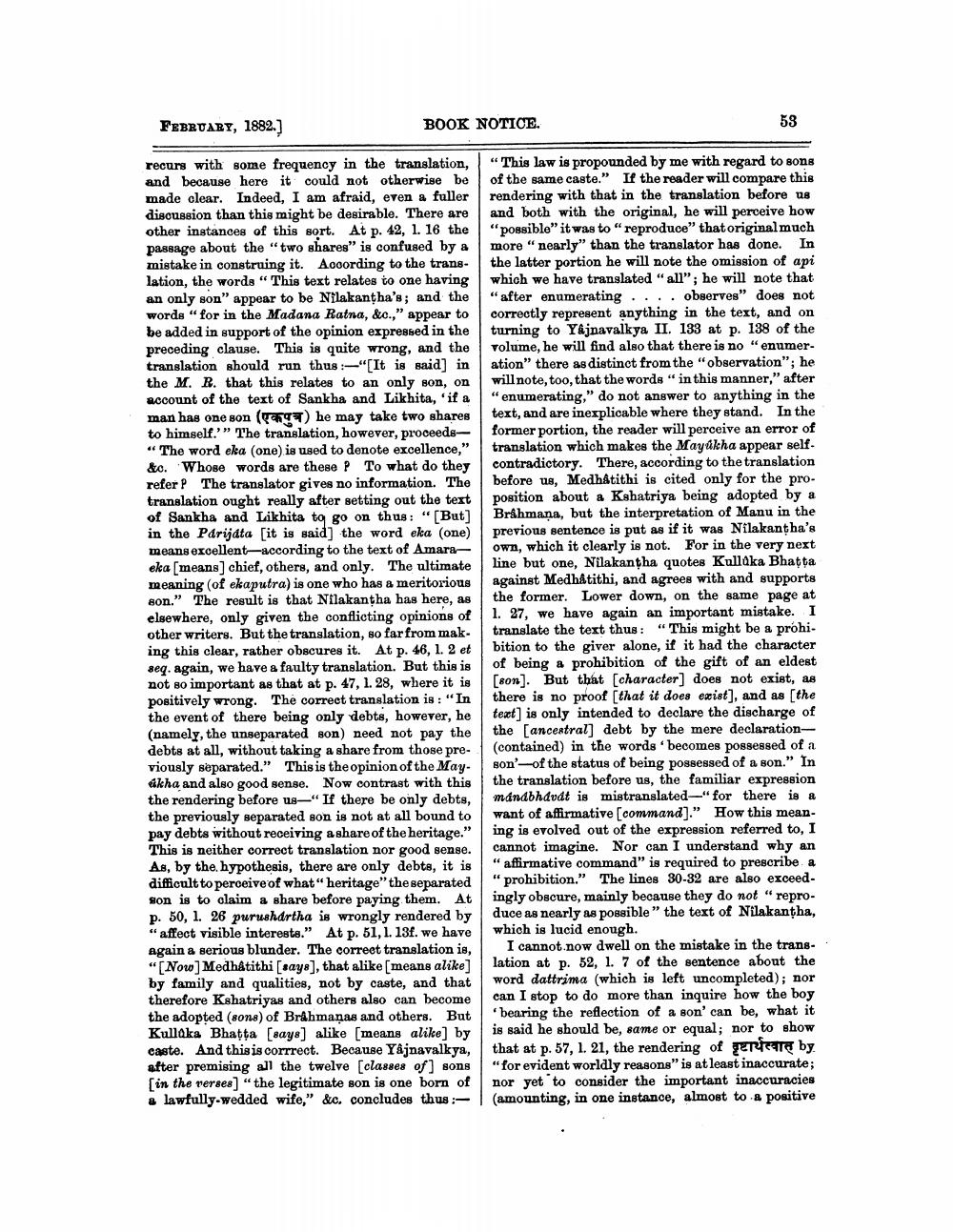________________
FEBRUARY, 1882.]
recurs with some frequency in the translation, and because here it could not otherwise be made clear. Indeed, I am afraid, even a fuller discussion than this might be desirable. There are other instances of this sort. At p. 42, 1. 16 the passage about the "two shares" is confused by a mistake in construing it. According to the translation, the words "This text relates to one having an only son" appear to be Nilakantha's; and the words "for in the Madana Ratna, &c.," appear to be added in support of the opinion expressed in the preceding clause. This is quite wrong, and the translation should run thus:-"[It is said] in the M. R. that this relates to an only son, on account of the text of Sankha and Likhita, 'if a man has one son (g) he may take two shares to himself." The translation, however, proceeds "The word eka (one) is used to denote excellence," &c. Whose words are these ? To what do they refer? The translator gives no information. The translation ought really after setting out the text of Sankha and Likhita to go on thus: "[But] in the Parijata [it is said] the word eka (one) means excellent-according to the text of Amaraeka [means] chief, others, and only. The ultimate meaning (of ekaputra) is one who has a meritorious son." The result is that Nilakantha has here, as elsewhere, only given the conflicting opinions of other writers. But the translation, so far from making this clear, rather obscures it. At p. 46, 1. 2 et seq. again, we have a faulty translation. But this is not so important as that at p. 47, 1. 28, where it is positively wrong. The correct translation is: "In the event of there being only debts, however, he (namely, the unseparated son) need not pay the debts at all, without taking a share from those previously separated." This is the opinion of the Mayakha and also good sense. Now contrast with this the rendering before us-"If there be only debts, the previously separated son is not at all bound to pay debts without receiving a share of the heritage." This is neither correct translation nor good sense. As, by the. hypothesis, there are only debts, it is difficult to perceive of what " heritage" the separated son is to claim a share before paying them. At p. 50, 1. 26 purushdrtha is wrongly rendered by "affect visible interests." At p. 51, 1. 13f. we have again a serious blunder. The correct translation is, "[Now] Medhâtithi [says], that alike [means alike] by family and qualities, not by caste, and that therefore Kshatriyas and others also can become the adopted (sons) of Brahmanas and others. But Kullaka Bhaṭṭa [says] alike [means alike] by caste. And this is corrrect. Because Yajnavalkya, after premising all the twelve [classes of] sons [in the verses] "the legitimate son is one born of a lawfully wedded wife," &c. concludes thus:
BOOK NOTICE.
53
"This law is propounded by me with regard to sons of the same caste." If the reader will compare this rendering with that in the translation before us and both with the original, he will perceive how "possible" it was to "reproduce" that original much more "nearly" than the translator has done. In the latter portion he will note the omission of api which we have translated "all"; he will note that "after enumerating. . . . observes" does not correctly represent anything in the text, and on turning to Yajnavalkya II. 133 at p. 138 of the volume, he will find also that there is no "enumeration" there as distinct from the "observation"; he will note, too, that the words " in this manner," after "enumerating," do not answer to anything in the text, and are inexplicable where they stand. In the former portion, the reader will perceive an error of translation which makes the Mayúkha appear selfcontradictory. There, according to the translation before us, Medhâtithi is cited only for the proposition about a Kshatriya being adopted by a Brahmana, but the interpretation of Manu in the previous sentence is put as if it was Nilakantha's own, which it clearly is not. For in the very next line but one, Nilakantha quotes Kullûka Bhaṭṭa against Medhâtithi, and agrees with and supports the former. Lower down, on the same page at 1. 27, we have again an important mistake. I translate the text thus: "This might be a prohibition to the giver alone, if it had the character of being a prohibition of the gift of an eldest [son]. But that [character] does not exist, as there is no proof [that it does exist], and as [the text] is only intended to declare the discharge of the [ancestral] debt by the mere declaration(contained) in the words 'becomes possessed of a son'-of the status of being possessed of a son." In the translation before us, the familiar expression mándbhávát is mistranslated-"for there is a want of affirmative [command]." How this meaning is evolved out of the expression referred to, I cannot imagine. Nor can I understand why an "affirmative command" is required to prescribe a "prohibition." The lines 30-32 are also exceedingly obscure, mainly because they do not "reproduce as nearly as possible" the text of Nilakantha, which is lucid enough.
I cannot.now dwell on the mistake in the translation at p. 52, 1. 7 of the sentence about the word dattrima (which is left uncompleted); nor can I stop to do more than inquire how the boy 'bearing the reflection of a son' can be, what it is said he should be, same or equal; nor to show that at p. 57, 1. 21, the rendering of gerard by "for evident worldly reasons" is at least inaccurate; nor yet to consider the important inaccuracies (amounting, in one instance, almost to a positive




